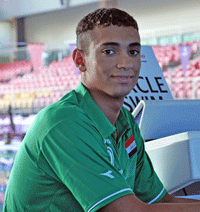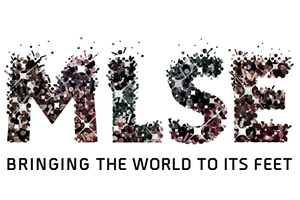By Emily Ridlington, Sports Media Canada Special Correspondent and
International Olympic Committee Young Reporter
Singapore- Eight years ago, Iraqi Ahmed Salam Al-Dulaimi took his first dip in the water, in Baghdad’s Tigris River.
“When I first started I didn’t know how to swim at all,” said the 18-year-old, speaking in Arabic through a translator.
After several years, he started competing in swimming competitions locally. He has also gone to meets abroad in Jordan and Italy.
From 2006 to 2008, while Iraq was under military occupation, he could not go to the pool to swim. “He had to stop for three years because of the political situation, theenvironment for sport was not good,” said Iraqi swim coach Kalmustafa Al-Tumaijari.
That, he says, made him feel disappointed and depressed: “I want people to not focus on the past but to look to the future.”
Fast forward to the present and Al-Dulaimi is swimming alongside the world’s best young athletes at the inaugural Youth Olympic Games in the 50-meter freestyle. He finished 33rd out of 50 in the event. He clocked 26.09 seconds, almost four seconds behind Andrii Govorov of Ukraine. Almost four seconds in the pool is a lifetime.
I don’t think many of Al-Dulaimi’s competitors realize that for him, just being present at the Games and being able to swim in a pool and to be out of harm’s way is a miracle. Al-Dulaimi did not have the jazziest up-to-date swim suit as worn by swimming powerhouses such as the Aussies. A minor detail — trivial when compared to what Al-Dulaimi had to do to even be at the Games.
He is one of his country’s five athletes who competed in wrestling, weightlifting and fencing who had never had the chance to compete at a sporting event of this size. And this holds a great amount of weight when it comes to the future of sport in the country.
“The future of Iraq in sports looks good as we have many budding athletes,” said Maysaa Matrood, chef de mission for the National Olympic Committee of Iraq. Iraq was welcomed by the IOC as a member in 1948. The country has only participated in Summer Games and was barred in 2008 from competing in Beijing. Matrood said the current government backs the Olympic movement, especially the Youth Olympics. She said Iraq will have a presence at future Olympics.
Now as journalists, we all know we are not supposed to express emotion when reporting and that we distance ourselves from the story we are working on and from the people involved. But, I will admit the fact that I couldn’t help but be proud for Al-Dulaimi. One cannot imagine the things he has witnessed during his lifetime and what swimming at an international event meant for him and his nation.
At the beginning of the event, I was told my by mentors of the Young Reporters Program to write a story of 500 to 600 words. Beyond that the instructions were vague. It was no holds barred. While any good sports story documents who won and lost the race or the contest, I wanted to go beyond that and see who these young athletes are as individuals, and not merely as competitors.
I skimmed the start lists and noted which countries they represented. I bypassed the Brits and the Russians. I wanted to find someone for whom the Youth Olympic Games were much more than just another competition. Lo and behold, and I think it was with a little luck, the chef de mission for the Iraqi team was sitting behind me in the stands.
After chatting through a translator, she was quite literally ecstatic that I was interested in doing an interview with her young swimmer. She, Al-Dulaimi, his coach, three translators and I found a quiet spot after his race to sit down and chat. Sitting in a semi-circle, I would ask a question, it was then translated from English to Chinese and Chinese to Arabic. They would answer and the process would go in reverse.
While this took time and we all know the pressure and sense of urgency to have a looming deadline, it was with a sense of fascination that I listened to the tale of this teenager. At the end of the interview, I asked if there was anything else the interviewee wanted to say. To my surprise, Al-Dulaimi turned the tables on me and wanted to know how I got into my field and came to be in Singapore. The most surprising question he asked me was if I would take my ponytail out so he could see if my blonde hair was real. This was not done in a demeaning way. For him to see a young woman working and not wearing a hijab was a new and relatively foreign concept.
It was a learning experience for us all and really opened my eyes to where some of these athletes are coming from.
At the end of the interview, Al-Dulaimi apologized for taking so long to come up and meet me as he had a very important phone call to make. He had to call his father back in Baghdad to share with him the results of the race.
“I told him I was part of history,” said Al-Dulaimi. Reinforcing the fact that no matter what place the young Iraqi came in, all that mattered was that he was here.






